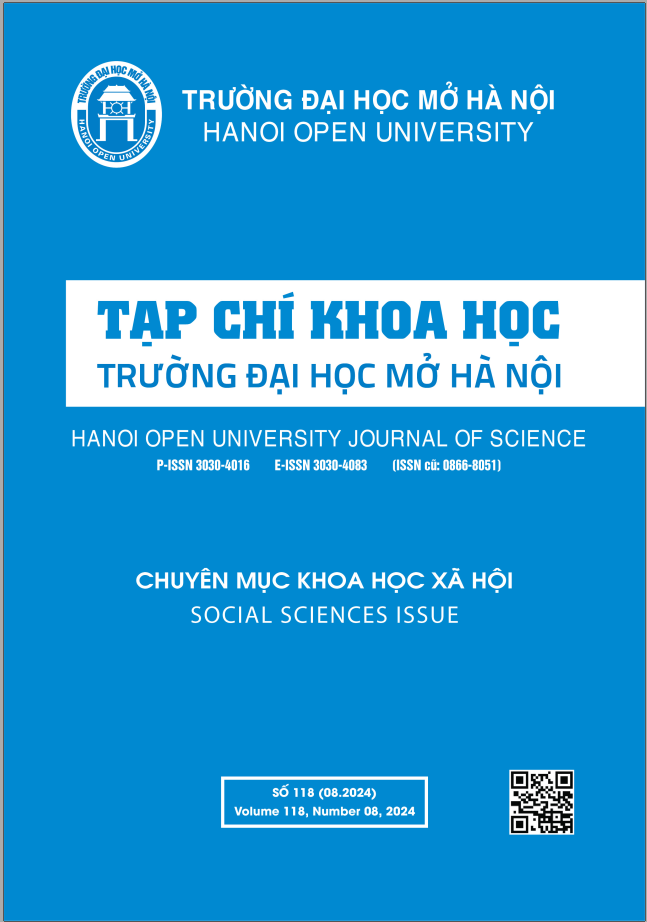SOME THEORETICAL BASIS AND EXPERIENCE FOR DEVELOPING WELLNESS TOURISM
DOI:
https://doi.org/10.59266/houjs.2024.446Từ khóa:
tourism, Wellness, development, wellness tourism, theoretical basis, practiceTóm tắt
Wellness tourism is the combination of two large and growing industries worth millions and billions of dollars: tourism and Wellness. Differences in the definition of wellness tourism in different countries have created specific differences in the segmentation of wellness tourists in different countries. Wellness tourism is often confused with medical tourism - not only by consumers but also in destination marketing. Using the desk study methodology, the paper aims to clarify some theoretical and practical bases for developing wellness tourism, thereby drawing some lessons for Vietnam in developing this kind of tourism.
Tài liệu tham khảo
[1]. B. Rickhi & S. Aung. Wellness is a state of mind, body, and spirit. 2006. Complementary and alternative health affiliate of the Canadian health network.
[2]. C. Michael Hall. Medical Tourism. The ethics, regulations, and marketing of health mobility. 2002. Routledge
[3]. Cohen et al. Peer wellness coaches for adults with mental illness. 2014. Psychiatric Services
[4]. Volume 65, Number 1https://doi. org/10.1176/appi.ps.650101
[5]. Dukes. Cultural effects on Wellness as it applies to society and the individual: An international comparison of Germany and the United States of America. 2016. Grand Valley State University
[6]. Grand Valley State University. Undergraduate Research and Creative Practice.
[7]. Hjalager & Richards. Tourism and gastronomy. 2002. Association for Tourism and Leisure Education (ATLAS)
[8]. JA Hattie et al. A factor structure of Wellness: Theory, assessment, analysis, and practice. 2004. Journal of Counseling and Development. Summer 2004. Volume 82.
[9]. J Stará, C Peterson . Understanding the concept of Wellness for the Future of the Tourism Industry: A literature review. 2017. Journal of Tourism & Services.
[10]. L Modise & ML Johannes. Well-being and Wellness in the twenty-first century: A theanthropocosmic approach. 2016. Journal of Religion and Health. Volume 55, pages 1876–1890, (2016).
[11]. Meikassandra et al. Wellness Tourism In Ubud.“A Qualitative Approach To Study The Aspects Of Wellness Tourism Development. 2020. Journal of Business on Hospitality and Tourism Vol 06 No 01, 2020: 79-93 https:// dx.doi.org/10.22334/jbhost.v6i1
[12]. Mick, DG, & Schwartz, B. Can consumers be wise? Aristotle speaks to the 21st century. In DG Mick, S. Pettigrew, CC Pechmann, & JL Ozanne (Eds.), Transformative consumer research for individual and collective well-being. 2012. New York: Taylor & Francis/Routledge.
[13]. Praprom, C. and Laipaporn, J. Betong: A potential wellness tourism destination in the deep south of Thailand. 2023. Geojournal of Tourism and Geosites, 46 (1).
[14]. Smith & Kelly. Wellness tourism. 2006. Tourism recreation research vol. 31(1), 2006: 1-4
[15]. Smith & Puczko. Health and wellness tourism. 2009. London & New York: Taylor & Francis/Routledge.
[16]. Smith and Puczko. Health, Tourism and Hospitality Spas, Wellness and Medical Travel. 2014. Routledge. ISBN 9780415638654
[17]. Thai Ngan. Get ahead of the post- pandemic healthcare tourism trend. 2021. Vietnam Law Electronic Newspaper
[18]. UJ Mirando, PUI Dabare, BTK Chathuranga. A Literature Review on How Wellness Tourism Contributes to Re-Building Sri Lankan Tourism. 2022. Skilanka Journal of Marketing, SLJM Vol 8 Special Issue.
[19]. World Tourism Organization. A Practical Guide to Tourism Destination Management. 2007. Madrid: WTO.
